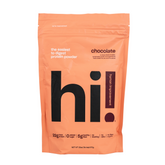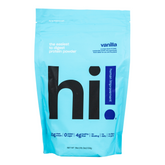Aging is inevitable. Losing strength, muscle, and cognitive sharpness? Not so much.
While creatine is often seen as a performance supplement for athletes, emerging research shows it plays a powerful role in healthier aging — fueling both muscle and mind resilience.
In this article, we'll explore how creatine helps support mobility, memory, and recovery as we age, and why it’s one of the smartest supplements to add to your long-term health strategy.
🏋️ 1. Creatine Helps Preserve Muscle Mass and Strength
One of the hallmarks of aging is sarcopenia — the progressive loss of muscle mass and strength, leading to frailty, slower recovery, and reduced independence.
Maintaining muscle isn't just about aesthetics — it’s crucial for balance, injury prevention, and long-term healthspan.
🔬 The science: Meta-analyses show that creatine supplementation during resistance training helps older adults gain significantly more strength and lean mass compared to training alone, by enhancing ATP regeneration in muscle cells to support more effective strength training and muscular repair.1
🧠 “Strength isn’t just about lifting more — it’s about living better, longer.”
🧠 2. Creatine Supports Brain Function and Cognitive Health
As we age, our brain’s energy systems become less efficient. This can contribute to cognitive decline, memory problems, and slower reaction times.
Creatine enhances brain energy metabolism, protects mitochondria, and may help buffer against age-related cognitive decline.
🔬 The science: Studies show creatine supplementation can improve working memory, executive function, and mental fatigue resistance, especially in older adults, by boosting ATP availability in neurons to maintain optimal brain cell communication and energy metabolism.2
🧬 “Creatine keeps your brain energized — helping you stay sharp and resilient over time.”
🦴 3. Creatine May Support Bone Health and Joint Function
Strong muscles protect your bones — but creatine may also directly support skeletal health.
Emerging research suggests creatine can influence osteoblast (bone-building cell) activity and improve bone mineral density when combined with resistance training.
🔬 The science: Early research suggests creatine users experience better bone density outcomes during strength-focused exercise programs, likely because creatine stimulates bone-building pathways while enhancing the mechanical loading effect of muscles on bones.3
🦴 “Stronger muscles and bones together help prevent falls, fractures, and mobility loss.”
🔁 4. Creatine Improves Recovery and Reduces Inflammation
Older adults often experience longer recovery times from exercise, injury, or illness. Creatine supports faster tissue repair and may lower markers of systemic inflammation.
🔬 The science: Research shows creatine supplementation reduces post-exercise muscle soreness and inflammation in aging populations, helping recovery by lowering oxidative stress and speeding up the replenishment of energy stores in muscle cells.4
🔋 “Faster recovery = more movement, more vitality, more life.”
🔬 5. Safe, Well-Studied, and Effective for Healthy Aging
One of creatine's biggest advantages? It's incredibly well-researched — not just for athletes, but for older adults as well.
It’s been shown to be safe for kidneys, liver, and overall health when used appropriately, even over long periods.
🔬 The science: The International Society of Sports Nutrition (ISSN) states that creatine is safe for aging populations, enhancing quality of life simply by saturating muscle and brain creatine stores without toxic buildup or harmful byproducts.5
✅ “Creatine is one of the few supplements that truly stands the test of time — literally.”
💡 Our Take
At Human Improvement, we believe aging well is about staying strong, energized, and resilient — not slowing down.
That’s why we created Performance Creatine: a clean, science-backed supplement designed to support your body and mind at every stage of life.
Better movement, sharper memory, faster recovery — that’s healthy aging, redefined.
📚 Learn more about creatine
- 👉 Creatine for Brain Function & Mental Health
- 👉 How Creatine Supports Cellular Health
- 👉 5 Benefits of Creatine That Have Nothing to Do With the Gym
- 👉 Why Creatine Is Important After 60
🔎 References
- Chilibeck, P. D. et al. (2017). Creatine supplementation during resistance training in older adults: a meta-analysis. Med Sci Sports Exerc, 49(4), 734–743.
- Rae, C. et al. (2003). Oral creatine monohydrate supplementation improves brain performance. Proc Biol Sci, 270(1529), 2147–2150.
- Candow, D. G. et al. (2011). Creatine supplementation on bone mineral density in aging populations. Nutr Res Rev, 24(2), 311–317.
- Rawson, E. S. et al. (2011). Creatine supplementation and recovery from exercise-induced muscle damage: a brief review. Amino Acids, 40(5), 1341–1346.
- Kreider, R. B. et al. (2017). ISSN position stand: safety and efficacy of creatine supplementation. J Int Soc Sports Nutr, 14, 18.









